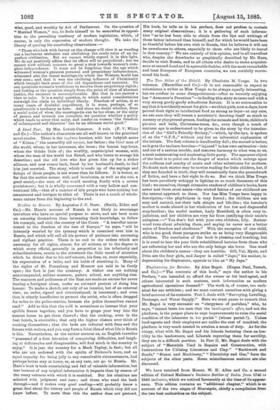The Two Sides of the Shield. By Charlotte M. Yonge.
In two volumes. (Macmillan and Co.)—It is not reasonable to expect so voluminous a writer as Miss Yonge to be always equally interesting, but we confess to some disappointment—after so recently enjoying her " Armourer's Prentices"—bifinding this story so tame and with a very strong goody-goody schoolroom flavour. It is no extenuation to say that it is evidently meant for girls—we think girls, now-a-days, have proved their right to intellectual food as strong as boys—at any rate, we are sure they will resent a novelette's devoting itself so much to nursery or playground games, feeding the animals and birds, children's pie-nice and balls, Christmas-trees, &o., even though a touch of maturer age is endeavoured to be given to the story by the introduc- tion of the " Girl's Friendly Society,"—which, by-the-bye, is spoken of as the " G.F.S.," without any but an inferential explanation of the initials. The first volume is insufferably dull ; the second is better, as it gets the taciturn heroine—" injured" in her own estimation—into and out of a serious trouble, and restores harmony to what was, to us, a most uninteresting and nnpleasing little party. The apparent object of the book is to point out the danger of stories which enlarge upon the coldness and craelty of aunts and other substitutes for mothers. No doubt such stories may be unwise reading for little children, but, if they are founded in truth, they will occasionally form the groundwork of fiction, and have a fair right to do so. But we think Miss Yonge has been peculiarly unhappy in lighting on so much literature of this kind ; we ourselves, though extensive readers of children's books, have never met these cruel aunts—the wicked fairies of our childhood are the nearest approach to them. Nor has Miss Yonge been. happy in description,—the playfulness is very forced ; the children are not easy and natural, nor their talk simple and life-like ; the heroine's mother is made absurd in her vindication of her low and disgraceful step-brother; the model mother, Lady Merrifield, is often very in- judicious, and her children are very far from justifying their uncle's eulogium :—" You don't fail with your own children, Lily. Bother. wood runs about admiring them, and saying he never saw a better union of freedom and obedience." With the exception of one child, who is too good, these paragons strike us as being very disagreeable children. The conclusion of the book is plotting and touching, but it is cruel to tear the poor little rehabilitated heroine from those who are reforming her and who are the only beings she loves. One word about the children's names—they are horrible. Gill, Val, Mysie, and Prim are the four girls, and jasper is called "Japs;" his mother, in deprecating his displeasure, appeals to him as " My Japs."


































 Previous page
Previous page